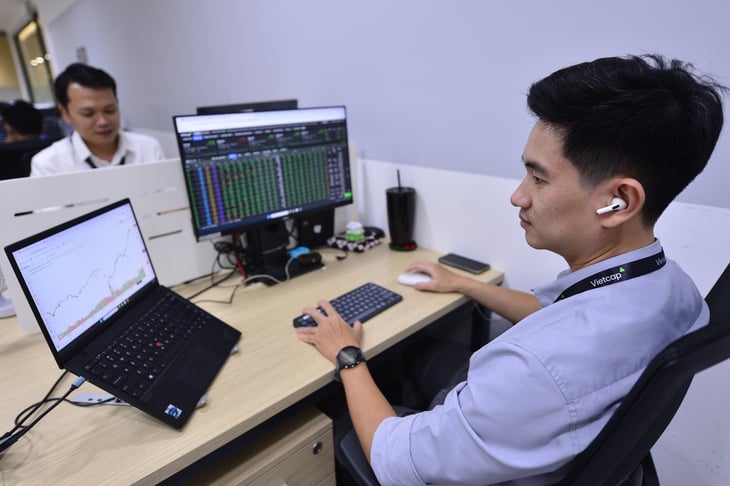
Money poured into stocks increased sharply, both from investors and outstanding loans of securities companies - Photo: QUANG DINH
Money "waiting" to buy stocks soars, margin debt also sets record
Data from the second quarter 2025 financial reports of securities companies shows that domestic investors have proactively increased their investment scale.
Specifically, the deposit balance of individual investors recorded a sharp increase of 35.9% compared to the previous quarter (equivalent to about VND 25,700 billion), bringing the total deposit value to nearly VND 97,200 billion at the end of June 2025.
Notably, this figure is approaching the historical peak of VND 104,700 billion recorded at the end of the first quarter of 2024. Note that this capital flow is purely domestic, excluding capital flows from foreign investors.
This remarkable development is considered one of the clear signals showing that the cash flow that has been staying out of the market has begun to return, demonstrating expectations and confidence in the recovery trend and sustainable growth in the coming period.
Meanwhile, the amount of loans (mainly margin) of securities companies in Vietnam is 303,000 billion VND, the highest ever, exceeding the market peak of 1,535 points in 2022.
Talking to Tuoi Tre Online , Mr. Truong Dac Nguyen - investment director of Blue Horizon Financial, said that currently many investors assess the level of risk from margin debt through a familiar criterion, which is the ratio of outstanding loans to equity of the entire securities company system.
Generally, if the margin ratio has not exceeded the legal threshold of 200%, or has not returned to the historical peak of about 130%, it can still be considered safe. However, this does not fully reflect the local risks in each company.
As at HSC, by the end of the second quarter, while HSC's equity was at over VND10,000 billion, the outstanding margin loan balance was approaching VND20,000 billion, corresponding to the allowed ceiling of 2 times the equity.
TCBS - the unit holding the largest margin debt in the market, currently accounts for nearly 10% of the total outstanding debt of the entire system, with a usage rate of 162.5% of equity. Meanwhile, VPS - the company with the leading brokerage market share - also recorded a margin ratio of 135.9%.
These figures show that, although the entire market has not exceeded the technical threshold of 200%, many large securities companies have been quite stressed in their lending "room", causing risks to appear earlier than investors generally perceive, Mr. Nguyen emphasized.
So what is there to worry about margin tension?
Recently, some leading securities companies have also proactively adjusted their lending rates. According to experts, this move has contributed to creating pressure on the market and is one of the reasons leading to the strong adjustment session on July 29.
Tightening margins has narrowed investors' room for financial leverage, especially for stocks that are heavily dependent on short-term cash flows. When they no longer have enough buying power from margin loans, investors are forced to reduce their portfolio weight or proactively sell to reduce financial pressure, thereby creating a widespread selling effect in the market.
"Although the system is not technically "overloaded" and has not reached its peak, the pressure on lending activities has been evident and widespread. This will change investor behavior, which is no longer as optimistic as in the second quarter," said Mr. Truong Dac Nguyen.
According to this person, the tight margin situation will clearly affect a certain group of stocks, especially those that "follow the cash flow" such as real estate and securities. This is a group of stocks that depends heavily on demand from margin activities, so it is easily affected when lending space is narrowed.
Conversely, for stocks that are following a clear growth story and are priced based on fundamentals and are not heavily dependent on short-term cash flows, the drawdown strategy can still hold and create long-term opportunities.
It should be emphasized that many securities companies are still in a defensive state after the strong volatility of stocks in the beginning of the year, and have not yet adjusted their growth plans or increased capital, or borrowed capital to expand lending space. This explains why the margin room is approaching the maximum level, but in Mr. Nguyen's opinion, this is not necessarily a negative sign.
Source: https://tuoitre.vn/tien-cho-mua-chung-khoan-tang-vot-margin-cang-can-luu-y-gi-20250731081714633.htm




































































































Comment (0)